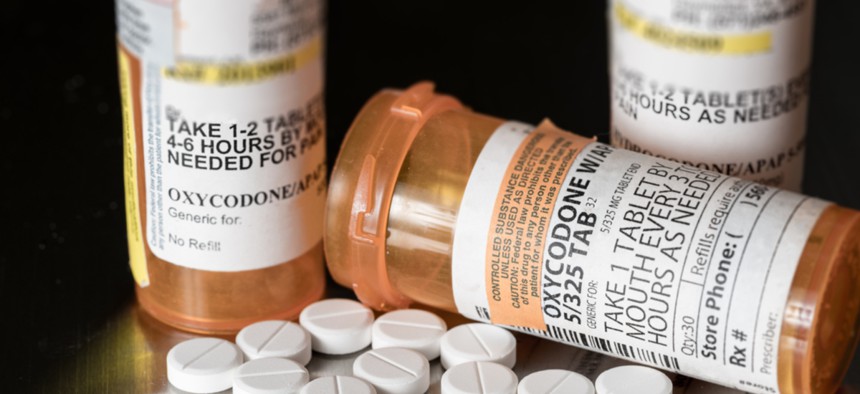Connecting state and local government leaders
New research found opioids were prescribed less often in states where marijuana has been legalized for medicinal or recreational use.
The opioid epidemic has claimed the lives of over 700,000 Americans. While no state has been immune to the crisis, overdoses have been particularly devastating in certain states, like Tennessee, Kentucky, and West Virginia.
As was revealed in a federal database published by the Washington Post last year, the sheer number of pills prescribed by doctors has been staggering.
The disparities in prescription habits by state can be seen in CDC data. In 2017, there were 94.4 opioid prescriptions per 100 people in Tennessee, for example, and in some states, prescriptions have begun to outnumber people. While states are trying initiatives like prescription drug monitoring programs in order to bring those numbers down, researchers say their new study suggests that a different legislative solution—making marijuana legal—might be effective.
The study published this month in the Journal of Health Economics found that states that legalized recreational or medical marijuana saw a decline in the number of opioid prescriptions.
“People have been talking about cannabis as a substitute for opioid for years,” said Benjamin McMichael, a law professor at the University of Alabama and the study’s lead researcher. “We focused on the individual provider level to provide a uniquely insightful look at how individual doctors changed their prescribing habits when marijuana is available.”
The study found that a state allowing either medical or recreational marijuana use reduced the total number of patients receiving opioids, the number of days opioids were prescribed for, and the likelihood an individual provider would prescribe opioids. The data examined by the researchers included 1.5 billion opioid prescriptions between 2011 and 2018, which they said represented about 90% of all opioid prescriptions in that time frame.
States with access to medical marijuana saw a 4.2% reduction in the rate of opioid prescriptions, while states with access to recreational marijuana saw an 11.8% reduction.
It isn’t possible to track whether doctors are prescribing marijuana instead of opioids, because the drug isn’t legal at the federal level and, therefore, prescription information isn’t available. But McMichael said it’s likely that some doctors are switching patients over, and because there are also fewer unique pain patients, those who might otherwise contact a doctor for pain management are “skipping the middleman” and accessing recreational marijuana in states where it’s legal. “Why states with recreational laws saw a bigger drop in the rate of prescriptions is ripe for future research,” he said. “Recreational laws are more facilitative, so even if a doctor might be reluctant to prescribe, it’s easier to gain access.”
The new research is in line with smaller studies that have looked at opioid prescriptions filled under Medicare and Medicaid in states with medical marijuana laws. One study found that opioid prescriptions filled under Medicare fell by around 2.2 million daily doses per year once a state legalized medicinal marijuana. When medical marijuana dispensaries opened their doors, that number fell by 3.7 million daily doses per year. Similarly a study analyzing opioid prescriptions under Medicaid found that medical marijuana laws were associated with a 5.9% reduction in prescribing and recreational laws correlated to a 6.4% reduction.
Marijuana is not a substitute for all types of pain treatment. Generally, opioids are still the drug of choice for acute pain, such as after surgeries. Some experts say that marijuana, by contrast, is better for chronic pain and long-term conditions like cancer, where the otherwise extended use of opioids can cause the pills to lose their effectiveness and risk a patient becoming addicted.
Several states have passed laws or begun to consider legislation that would encourage doctors to swap their opioid prescribing habits in favor of marijuana. Illinois, which legalized recreational marijuana at the beginning of 2020, was on the forefront of this movement in 2018, when former Gov. Bruce Rauner, a Republican, signed the Alternative to Opioids Act. "This law will give thousands of Illinoisans who struggle with the negative side effects of opioids, including harmful addiction, another choice to manage their pain," Rauner said in a statement at the time. "This is not about personal opinions about cannabis. It's about giving people more control over their own health care and pain-relief options."
Other state leaders have been more reticent about using marijuana as an alternative. Some have cited research from the National Academy of Sciences that found that “while the use of cannabis for the treatment of pain is supported by well-controlled clinical trials…. very little is known about the efficacy, dose, routes of administration or side effects of commonly used and commercially available cannabis products in the United States.”
In New Hampshire, where only medical marijuana is legal, activists are pushing for a recreational laws and a similar policy to the one in Illinois that would encourage the drug as a substitute for opioids. But in late 2018, Republican Gov. Chris Sununu said he wouldn’t support the idea. “When we are dealing with opioids as the single biggest health crisis this state has ever had, you are going to tell me legalizing more drugs is the answer?” Sununu said. “Absolutely not.”
States like New Hampshire have taken alternative approaches to stem the flow of opioids to patients, such as prescription drug monitoring programs and policies that curtail the number of opioids that can be given with a single prescription. Researchers in the recent Health Economics study, however, found that “many of these policies simply limit access to opioids and may push individuals already dependent on prescription opioids to more dangerous drugs, such as heroin.”
Because of that, McMichael said he favors marijuana legalization as a tool for combating the opioid epidemic. “It does look like broad legalization would reduce opioid prescriptions, which could save lives,” he said.
Emma Coleman is the assistant editor for Route Fifty.
NEXT STORY: The Disproportionate Effects of Air Pollution




